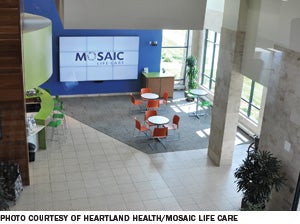No waiting? No problem at new streamlined clinics
 Upon entering one of seven new Mosaic Life Care urgent care and outpatient surgery clinics near St. Joseph, Mo., it's apparent that something is missing. For patients, that is cause for celebration.
Upon entering one of seven new Mosaic Life Care urgent care and outpatient surgery clinics near St. Joseph, Mo., it's apparent that something is missing. For patients, that is cause for celebration.
As soon as they step into one of the facilities, they are greeted by a life guide who greets them and then whisks them off to an exam room. No stop at the reception desk, no forms to fill out, no time wasted in a waiting room. Instead, it's: Let the patient care begin right away.
Forcing patients to play the waiting game is "not a positive way to get a visit started off, not optimal for anyone," says Mark Laney, M.D., president and CEO of Heartland Health, the system transitioning to Mosaic Life Care.
While staff tend to patients, family members and friends who accompany them to the clinic can pass the time in the modern-looking chef's area to see demonstrations of new healthful cooking. Or they can watch videos or play games on the nearby story wall screen or use a loaner electronic tablet in the tech area.
The new clinics and increased focus on its patient-first philosophy is part of Heartland's next generation of health service where clinics are now called life centers.
A 2009 Malcolm Baldrige National Quality Award winner, Heartland is on a patient-centric path that predates the Affordable Care Act (ACA), says Tama Wagner, chief brand officer, Heartland, which is a member of the Mayo Clinic Care Network.
"Our strategic thinking over the years, even prior to the realities of the ACA, was driving us toward moving away from fee-for-service for health care delivery and putting more focus on root causes of diseases beyond human behaviors such as smoking and weight control," she says.
Heartland eventually plans to repurpose waiting rooms at its original 52 clinics and Heartland Regional Medical Center. How that happens is yet to be determined, Laney says, but it will be done in a way that is consistent with Heartland's philosophy as it changes to Mosaic Life Care.
"We really want to be innovators and find new ways to care for people that have more value and are more holistic," Laney says. "So, we're willing to try things; we're willing to sometimes fail.
"But we're not willing to just keep doing things the same way because it's obvious to everybody that health care as we provide it today in America is expensive; it's not well organized and it's often not centered around the patients," he says.




